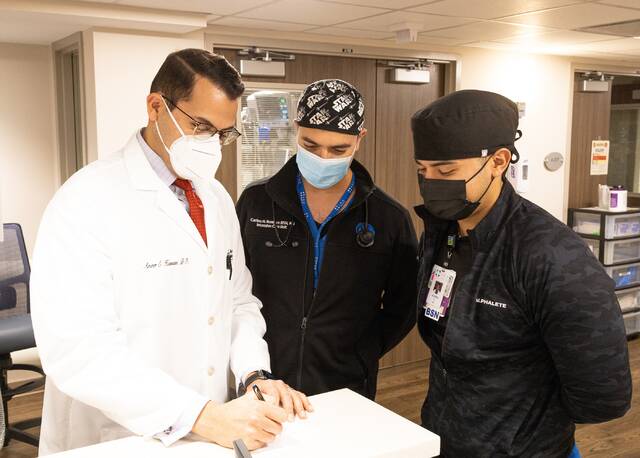HARLINGEN – People with brain injuries now have access to new treatments thanks to a new unit designed specifically for that purpose.
The Neuro Intensive Care Unit at Valley Baptist Medical Center opened March 9 with state-of-the-art neuro specific equipment to complement the hospital’s Comprehensive Stroke Center. The unit also enhances the larger Valley Baptist Neuroscience Institute abilities.
“Our new neuro ICU offers the latest and most cutting-edge technology for our patients, especially for those who have suffered brain traumas and strokes,” said Dr. Ameer Hassan, head of the neuroscience department at Valley Baptist.
“The idea is for us to help our underserved communities and offer the advanced neurological care our patients need without them having to leave the area and their support systems,” Hassan said.
Brain injury can result from a variety of causes, including a fall, a blow to the head, or a stroke. While these are brief events, they can cause prolonged and severe problems including amnesia, poor concentration, difficulties in speaking and reading, and even such disconcerting occurrences as the inability to recognize people and things they’ve known for years.
That’s why quick response at the moment of injury (including stroke) is so important, and that’s why the new Neuro ICU is a much-needed addition to the neuroscience department at Valley Baptist.
It was with great excitement Hassan detailed the equipment and capacities of the new unit.
“Our new Neuro ICU brings the latest technology in neuro ICU and telemonitoring services as well as continuous EEG to Harlingen, to the Rio Grande Valley,” he said.
He took a brief segue into events leading up to the ICU.
“This mission (of neurocritical care) has improved compared to before us getting here,” he said. “Every time we improved the neurocritical care with new technology, our hemorrhage patients, whether they’re intracerebral hemorrhage or subarachnoid hemorrhage, patients continue to improve. Add now the latest advances in stroke care and in trauma, we’re able to help more patients get out of their disability and be able to hopefully go home fully functional.”
Now that possibility becomes even more probable with the advantages in the new Neuro ICU, which offers 24/7 EEG monitoring and camera visualization. An EEG (electroencephalogram) is a test that detects abnormalities in the brain waves or in the electrical activity of the brain.
“You can see if the patient’s having pseudo seizures or real seizures,” he said. “You can see what’s going on and really keep a closer eye on your patients for better outcomes.”
The new Neuro ICU provides access to a CT scan for each patient. Previously, if there was a change in a neuro exam at 2 a.m. for example, the doctor would be called, and the patient would have to be transported downstairs for the CT and then be brought back.
No more. Now a CT in the Neuro ICU is brought to a patient.
And there’s more.
“Now the big one is for brain injury, cerebral edema patients, patients that have lots of swelling in the brain due to stroke or traumatic brain injury,” Hassan said. “These patients can also develop seizures.”
Previously only two EEG carts were available to determine if the patients were actively seizing or instead experiencing something called non-convulsive status.
“They don’t need to be doing the constant shaking to actually still be having active seizures,” he said. “You have to be connected to an EEG to see that. Now the neuro ICU has that built into all the rooms. They have it built into their screens. So the tech just comes and connects them and then immediately is getting into all their other vitals on the big screen. So that’s a big deal, it’s very very unique.”




